Abstract
This paper presents and analyses a set of data that reveal secondary education students’ stance on the educational activities that were realised during a UMI (ubiquitous, mobile computing and the Internet of Things) Summer School. This Summer School deals with an IoT based recycling management application development and is part of UMI-Sci-Ed project that provides a training framework on UMI learning, for students aged between 14–16, with the use of properly designed educational scenarios and communities of practice (CoP) by setting UMI technologies as learning means and learning outcomes, simultaneously. The analysis focuses on the students’ satisfaction and engagement (observed through a set of questionnaires) in relation with students’ potential to follow the activities, the perceived, by the students, easiness, enjoyment and usefulness while setting as parameters the student gender and age. The results clearly show high student acceptability and engagement with the designed IoT-driven activities and reveal certain differentiations with respect to gender and age in these aspects. These findings, together with the observations that high student satisfaction does not translate to equally high engagement and that enjoyment is a critical factor, provide a basis for future adjustment of the educational scenarios and activities scope and design in order to enhance the UMI-Sci-Ed impact on student preference for a future career in the UMI technologies domain.
Access this chapter
Tax calculation will be finalised at checkout
Purchases are for personal use only
Similar content being viewed by others
References
Bartel, A., Figas, P., Hagel, G.: Using a scenario-based approach for learning software engineering. In: Hagel, G., Mottok, J. (eds.) ECSEE – European Conference Software Engineering Education. Shaker, Aachen, pp. 167–179 (2014)
Elmore, B., Mariappan, J., Hays, G.: Improving performance through simulation - a scenario based learning approach. White Paper, Experia Solutions (2003)
Findeli, A.: Rethinking design education for the 21st century: theoretical, methodological, and ethical discussion. Des. Issues 17(1), 5–17 (2001)
Goumopoulos, C., et al.: The UMI-Sci-Ed platform: integrating UMI technologies to promote science education. In: 10th International Conference on Computer Supported Education, vol. 2, pp. 78–90. SciTePress, Funchal (2018)
Iossifides, A., Zaharakis, I.D., Stefanis, V.: D1.1 – data management plan (v2.0), Public Deliverable, Horizon 2020 Project UMI-Sci-Ed, No. 710583 (2017)
Jing, H., Lo, D.C.-T., Ying, X., Lartigue, J.: Integrating internet of things (IoT) into STEM undergraduate education: case study of a modern technology infused courseware for embedded system course. In: 2016 IEEE Frontiers in Education Conference (FIE), pp. 1–9. Erie, PA, USA (2016)
Mavroudi, Α., Divitini, Μ., Fragou, Ο., Giannakos, Μ.: D7.1 – evaluation concept-framework and piloting, public deliverable, Horizon 2020 Project UMI-Sci-Ed, No 710583 (2017)
Mavroudi, A., Divitini, M., Gianni, F., Mora, S., Kvittem, D.R.: Designing IoT applications in lower secondary schools, In: 2018 IEEE Global Engineering Education Conference (EDUCON), pp. 1120–1126. IEEE, Tenerife (2018)
Reiser, R.A., Dempsey, J.V.: Trends and issues in instructional design and technology. Pearson Merrill Prentice Hall, Upper Saddle River (2011)
Snyder, W., Briggs, X.N.D.S.: Communities of practice: a new tool for government managers. November 2003 Series Collaboration. IBM Center for the Business of Government (2003)
Wenger, E.: Communities of practice: a brief introduction. University of Oregon (2011)
Zaharakis, I.D., Sklavos, N., Kameas, A.D.: Exploiting ubiquitous computing, mobile computing and the internet of things to promote science education. In: 8th IFIP International Conference on New Technologies, Mobility & Security (NTMS 2016), pp. 1–2. ΙΕΕΕ, Cyprus (2016)
Acknowledgments
The UMI-Sci-Ed project has received funding from the European Union’s Horizon 2020 research and innovation programme under grant agreement No 710583.
Author information
Authors and Affiliations
Corresponding authors
Editor information
Editors and Affiliations
Rights and permissions
Copyright information
© 2018 Springer Nature Switzerland AG
About this paper
Cite this paper
Glaroudis, D., Iossifides, A., Spyropoulou, N., Zaharakis, I.D. (2018). Investigating Secondary Students’ Stance on IoT Driven Educational Activities. In: Kameas, A., Stathis, K. (eds) Ambient Intelligence. AmI 2018. Lecture Notes in Computer Science(), vol 11249. Springer, Cham. https://doi.org/10.1007/978-3-030-03062-9_15
Download citation
DOI: https://doi.org/10.1007/978-3-030-03062-9_15
Published:
Publisher Name: Springer, Cham
Print ISBN: 978-3-030-03061-2
Online ISBN: 978-3-030-03062-9
eBook Packages: Computer ScienceComputer Science (R0)


